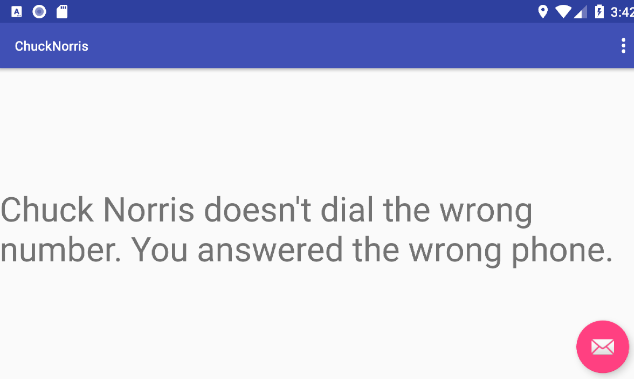Let's Build Chuck Norris! - Part 7: Android and JNA
Note: This is part 7 of the Let’s Build Chuck Norris! series.
Last time we managed to cross-compile and run C++ code for Android.
It’s now time to write some Java code, but we need to take a detour on the desktop first.
Java bindings #
Let’s create a new Java library project with gradle:
$ cd chucknorris
$ mkdir java && cd java
$ gradle init --type java-library
Gradle created a bunch of files, but for now we just care about the sources and the tests.
Our goal is to write a test that demonstrates we can indeed get some ChuckNorris facts.
Let’s start by removing cruft from the generated build.gradle:
dependencies {
- api 'org.apache.commons:commons-math3:3.6.1'
- implementation 'com.google.guava:guava:23.0'
}
Then let’s fix the source files that gradle created so that we have proper package:
$ tree java
├── build.gradle
├── gradle
└── src
├── main
│ └── java
│ └── com
│ └── chucknorris
│ └── ChuckNorris.java
└── test
└── java
└── com
└── chucknorris
└── ChuckNorrisTest.java
Now we can write a failing test:
/* In ChuckNorrisTest.java */
public class ChuckNorrisTest {
@Test
public void testGetFact() {
ChuckNorris ck = new ChuckNorris();
String fact = ck.getFact();
assertThat(fact, containsString("Chuck Norris"));
}
}
/* In ChuckNorris.java */
public class ChuckNorris {
String getFact() {
return "";
}
}
Let’s run the tests:
$ ./gradlew test
> Task :test FAILED
com.chucknorris.ChuckNorrisTest > testGetFact FAILED
java.lang.AssertionError at ChuckNorrisTest.java:14
1 test completed, 1 failed
# open build/reports/tests/test/index.html
java.lang.AssertionError:
Expected: a string containing "Chuck Norris"
but: was ""
OK, this fails for the good reason.
Now we can try and load our shared library using JNA.
First, we add the dependency in the build.gradle file:
dependencies {
+ api 'net.java.dev.jna:jna:4.5.1'
testImplementation 'junit:junit:4.12'
}
Then we’re ready to use JNA:
- We use
Native.loadLibrary()to load the shared library - We create a
CLibraryinterface that implements the C functions we want to call as methods. (justchuck_norris_initfor now). - We call
chuck_norris_initin the constructor of our ChuckNorris class, storing the result into a JNAPointer:
public class ChuckNorris {
private Pointer ckPointer;
private static CLibrary loadChuckNorrisLibrary() {
return (CLibrary) Native.loadLibrary("chucknorris", CLibrary.class);
}
public interface CLibrary extends Library {
CLibrary INSTANCE = loadChuckNorrisLibrary();
void chuck_norris_init();
}
public ChuckNorris() {
ckPointer = CLibrary.INSTANCE.chuck_norris_init();
}
public String getFact() {
return "";
}
}
And we run the tests:
$ ./gradlew test
java.lang.UnsatisfiedLinkError: Unable to load library 'chucknorris':
Native library (linux-x86-64/libchucknorris.so)
not found in resource path (...)
at com.sun.jna.NativeLibrary.loadLibrary(NativeLibrary.java:303)
at com.sun.jna.NativeLibrary.getInstance(NativeLibrary.java:427)
...
This is expected. We never told JNA where the libchucknorris.so file is.
As a reminder, the file currently lives in the build/default folder. Here’s how we built it:
$ cd build/default
$ conan install ../..
$ cmake -GNinja -DBUILD_SHARED_LIBS=ON ../..
$ ninja
There are several ways to tell JNA about the location of the shared library file. Here we’ll set a system property in the test block of the Gradle script:
def thisFile = new File(project.file('build.gradle').absolutePath)
def projectPath = thisFile.getParentFile()
def topPath = projectPath.getParentFile()
def cppPath = new File(topPath, "cpp")
def cppBuildPath = new File(cppPath, "build/default/lib")
test {
systemProperty 'jna.library.path', cppBuildPath
}
Now if we re-run the tests we get back our first failure:
$ ./gradlew test
java.lang.AssertionError:
Expected: a string containing "Chuck Norris"
but: was ""
But we did manage to instantiate the ChuckNorris class, so this is progress :)
Let’s implement getFact(), and while we’re at it, add a .close() method:
public interface CLibrary extends Library {
// ...
void chuck_norris_init();
String chuck_norris_get_fact(Pointer pointer);
void chuck_norris_deinit(Pointer pointer);
}
public ChuckNorris() {
ckPointer = CLibrary.INSTANCE.chuck_norris_init();
}
public String getFact() {
return CLibrary.INSTANCE.chuck_norris_get_fact(ckPointer);
}
public void close() {
CLibrary.INSTANCE.chuck_norris_deinit(ckPointer);
}
}
Re-run the tests:
$ ./gradlew test
BUILD SUCCESSFUL
Success!
Creating a new Android project #
Now we know:
- How to compile the C++ code for Android.
- How to load some C++ in Java, but only for the desktop.
It’s time to glue things together.
To do so, the best thing is to use Android Studio to create the gradle project, starting with a with a basic activity so we don’t have to deal with all the Android boilerplate.
Adapting the GUI #
Let’s pretend the ChuckNorris class already exists for now. 1
We start by adding a text_view ID for the text view in the content_main layout.
Then we adapt the MainActivity.java file to update the text view when clicking on the floating button action:
public class MainActivity extends AppCompatActivity {
private ChuckNorris chuckNorris;
@Override
protected void onCreate(Bundle savedInstanceState) {
chuckNorris = new ChuckNorris();
super.onCreate(savedInstanceState);
}
@Override
protected void onDestroy() {
chuckNorris.close();
super.onDestroy();
}
// ...
final TextView textView = (TextView) findViewById(R.id.text_view);
FloatingActionButton fab = (FloatingActionButton) findViewById(R.id.fab);
fab.setOnClickListener(new View.OnClickListener() {
@Override
public void onClick(View view) {
String fact = chuckNorris.getFact();
textView.setText(fact);
});
Adding ChuckNorris sources #
One of Java’s slogan is “Write Once, Run Everywhere” 2.
So let’s:
- Add JNA in the dependencies
- Add the ChuckNorris.java file we wrote earlier
And everything should work, right?
Fun with jnidispatch.so #
To check if our code works, let’s create an emulator, and click on play.
We’re faced with:
ChuckNorris has stopped
Open App Again
What? Chuck Norris can’t be stopped, this is unacceptable!

Time to look at the logs:
06-18 14:27:18.553 6890-6890/info.dmerej.chucknorris E/AndroidRuntime:
FATAL EXCEPTION: main
Process: info.dmerej.chucknorris, PID: 6890
java.lang.UnsatisfiedLinkError:
Native library (com/sun/jna/android-x86-64/libjnidispatch.so)
not found in resource path (.)
at com.sun.jna.Native.loadNativeDispatchLibraryFromClasspath
at com.sun.jna.Native.loadNativeDispatchLibrary
...
at info.dmerej.chucknorris.ChuckNorris.loadChuckNorrisLibrary
That’s a fun one. Turns out the name of dependency changes when compiling for Android, you need a @aar prefix 3:
dependencies {
// ...
implementation 'net.java.dev.jna:jna:4.5.1@aar'
}
Let’s try again!
We get the same error message, but this time it’s the chucknorris.so library that is not found:
06-18 14:27:18.553 6890-6890/info.dmerej.chucknorris E/AndroidRuntime:
FATAL EXCEPTION: main
Process: info.dmerej.chucknorris, PID: 6890
java.lang.UnsatisfiedLinkError: Unable to load library 'chucknorris':
Native library (android-x86-64/libchucknorris.so) not found
Fortunately, there’s a more or less standard solution.
If you put a .so file in a folder named src/main/jniLibs/<arch>, it will be included inside the Java application, and the Java code will be able to load it without any configuration.
The shared option #
For simplicity purposes, we built the ChuckNorris library as a static library, just to show that the C++ binary still needed libc++_shared.so to run.
But JNA needs a shared library to run.
Remember in part 4 we had to call CMake with -DBUILD_SHARED_LIBS=ON to get a shared library.
We’ll do the same thing, but going through Conan this time.
First, let’s add the ChuckNorris:shared option in the android profile:
...
[options]
*:pic=True
ChuckNorris:shared=True
Then adapt the recipe:
class ChucknorrisConan(ConanFile):
name = "ChuckNorris"
...
options = {"shared": [True, False]}
default_options = "shared=False"
def build(self):
cmake = CMake(self)
cmake_definitions = {}
if self.options.shared:
cmake_definitions["BUILD_SHARED_LIBS"] = "ON"
cmake.configure(defs=cmake_definitions)
def package(self):
self.copy("lib/libchucknorris.so", dst="lib", keep_path=False)
self.copy("lib/libc++_shared.so", dst="lib", keep_path=False)Then let’s re-create the Conan package:
$ conan create . dmerej/test --profile android --setting arch=x86_64
Exporting package recipe
...
package(): Copied 2 '.so' files: libchucknorris.so, libc++_shared.so
Package '<hash>' created
Finally let’s create symlinks to all .so files from the package.
$ cd android/app
$ cd src/main
$ mkdir -p jniLibs/x86_64
$ cd jniLibs/x86_64
$ ln -s ~/.conan/data/ChuckNorris/0.1/dmerej/test/<hash>/libchucknorris.so .
$ ln -s ~/.conan/data/ChuckNorris/0.1/dmerej/test/<hash>/libc++_shared.so .
Let’s try again:

Victory \o/
That’s all for today. See you next time!
-
This is also known as wishful thinking programming ↩︎
-
As always, the Wikipedia page contains lots of interesting stuff about this topic. ↩︎
-
You can find a note about this in JNA’s FAQ, but as far as I know, not anywhere else in the documentation. ↩︎
Thanks for reading this far :)
I'd love to hear what you have to say, so please feel free to leave a comment below, or read the contact page for more ways to get in touch with me.
Note that to get notified when new articles are published, you can either:
- Subscribe to the RSS feed
- Follow me on Mastodon
- Follow me on dev.to (mosts of my posts are mirrored there)
- Or send me an email to subscribe to my newsletter
Cheers!